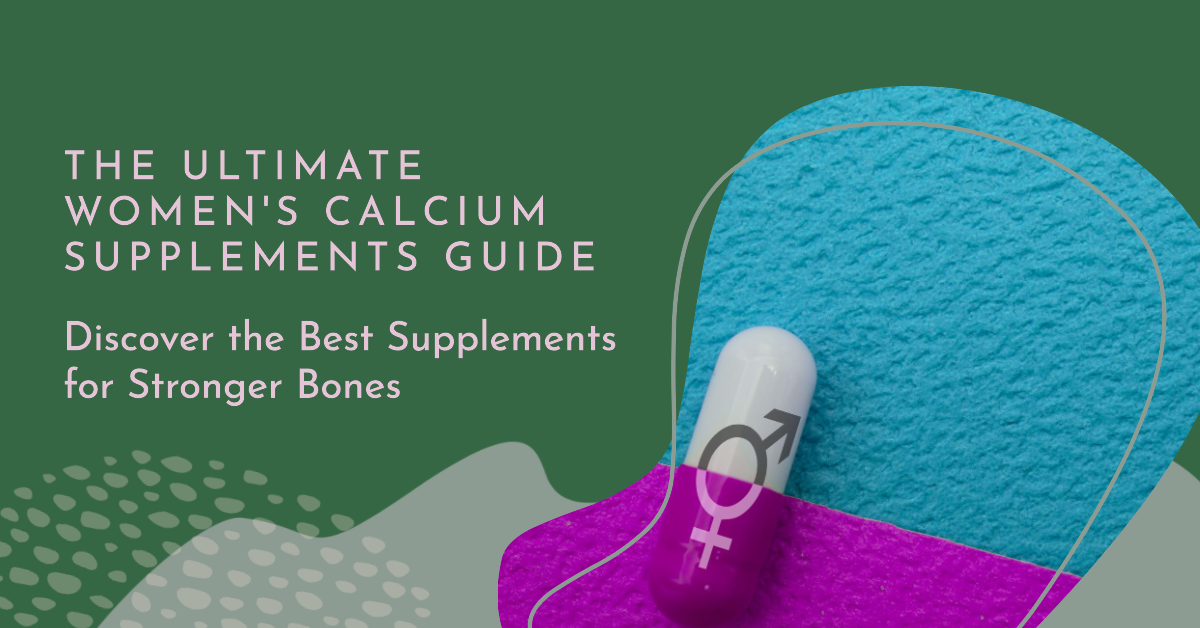Introduction
Welcome to our comprehensive article on calcium supplements for women! In this guide, we will explore the benefits of calcium supplements, the importance of calcium for bone health, and provide information on the recommended daily calcium intake for women. We will also discuss how calcium supplements can help boost bone strength, the different options available for calcium supplementation, and the potential side effects and risks to be aware of. Additionally, we will touch on other factors that contribute to overall bone health, such as the importance of vitamin D, a balanced diet, and physical activity. So, let’s dive in and learn all about calcium supplements for women!
Benefits of Calcium Supplement for Women
Calcium supplements for women offer a range of benefits that are essential for their overall health and well-being. One of the primary benefits of calcium supplementation is the promotion of strong and healthy bones. Calcium plays a crucial role in maintaining bone density, which is especially important for women as they age and are at higher risk for developing osteoporosis. Additionally, calcium supplements can also help reduce the risk of fractures and improve overall bone strength.
Calcium supplements also contribute to the proper functioning of muscles and nerves. Calcium ions are involved in transmitting nerve signals and are necessary for muscle contraction. By ensuring an adequate intake of calcium through supplementation, women can support their muscle and nervous system health.
Calcium is not only beneficial for bone health but also plays a vital role in blood clotting, hormone regulation, and maintaining a regular heartbeat. By taking calcium supplements, women can support these essential bodily functions and maintain optimal overall health.https://www.youtube.com/embed/H2_C82RP_ys
1. Importance of Calcium for Bone Health
1.1 Role of Calcium in Bone Strength
Calcium is a mineral that is essential for the development and maintenance of strong and healthy bones. It is the primary component of bone tissue and plays a crucial role in bone density and strength. Adequate intake of calcium throughout life, especially during childhood and adolescence, is essential for achieving optimal peak bone mass.
Calcium is continuously remodeled in the body, with old bone being replaced by new bone. This remodeling process relies on a sufficient supply of calcium to support the formation of new bone tissue. If calcium levels are low, the body may pull calcium from the existing bone, leading to decreased bone density and increased risk of fractures.
1.2 Calcium Deficiency and Bone Health
Insufficient calcium intake can have detrimental effects on bone health, particularly in women. Calcium deficiency can contribute to the development of osteoporosis, a condition characterized by weak and brittle bones. Osteoporosis increases the risk of fractures, especially in the hips, spine, and wrists.
Women are at higher risk for developing osteoporosis due to hormonal changes during menopause, which can lead to accelerated bone loss. Additionally, women generally have smaller and thinner bones compared to men, making them more susceptible to fractures caused by bone loss.
To minimize the risk of calcium deficiency and promote good bone health, women should ensure they meet the recommended daily calcium intake.
Any Questions🤔?
Reach out to us! We’re here to clarify and prioritize your well-being. 🌟
2. Calcium Supplement for Women
2.1 Recommended Daily Calcium Intake for Women
The recommended daily calcium intake for women varies depending on age and life stage. The following are the general recommendations for calcium intake:
- 1,000 mg per day for adult women aged 19-50 years
- 1,200 mg per day for women aged 51 years and older
It is important to note that these recommendations may vary for pregnant and lactating women, as well as those with specific health conditions. It is always best to consult with a healthcare professional to determine the appropriate calcium intake for individual needs.
2.2 Choosing the Right Calcium Supplement
When selecting a calcium supplement, it is essential to consider several factors. First, it is crucial to choose a calcium supplement that is easily absorbed by the body. Calcium citrate and calcium carbonate are two commonly used forms of calcium supplements.
Calcium citrate is generally recommended for individuals with low stomach acid or those taking medications that reduce stomach acid production, as it is more easily absorbed in these circumstances. Calcium carbonate, on the other hand, is often taken with meals as it requires stomach acid for optimal absorption. Consulting with a healthcare professional can help determine which form of calcium supplement is best for individual needs.
2.3 Calcium Supplement Options for Women
There are various calcium supplement options available for women. These include calcium tablets, capsules, chewable tablets, and liquid forms. Each form has its advantages and considerations, such as ease of consumption and individual preferences. It is recommended to follow the manufacturer’s instructions for dosage and administration when taking calcium supplements.
Before starting any calcium supplementation, it is advisable to consult with a healthcare professional to determine the appropriate dosage and to assess any potential interactions with other medications or existing health conditions.
3. Boosting Bone Strength with Calcium Supplement
3.1 How Calcium Supplements Help Build Stronger Bones
Calcium supplements play a vital role in boosting bone strength and density. By increasing calcium intake through supplementation, women can ensure their bodies have a sufficient supply of calcium to support bone remodeling and the formation of new bone tissue.
Calcium supplements work by increasing the availability of calcium in the body, which is necessary for proper bone formation. These supplements provide an additional source of calcium to support bone health, especially if dietary intake is insufficient. Regular and consistent intake of calcium supplements can help maintain optimal bone density, reduce the risk of fractures, and promote overall bone strength.
3.2 Studies and Research on Calcium Supplement for Bone Strength
Numerous studies have been conducted to investigate the effectiveness of calcium supplementation in promoting bone strength. Research has consistently shown that calcium supplements, when taken in combination with vitamin D and other nutrients, can lead to increased bone mineral density and a decreased risk of fractures in both premenopausal and postmenopausal women.
A study published in the Journal of Bone and Mineral Research found that calcium supplementation significantly increased bone mineral density and reduced bone loss in postmenopausal women. Another study published in the New England Journal of Medicine demonstrated that calcium and vitamin D supplementation reduced the risk of hip fractures in elderly women by 43%.
These findings highlight the importance of calcium supplementation in maintaining and improving bone strength, particularly in women.
4. Calcium Supplement Dosage and Safety
4.1 Correct Calcium Supplement Dosage for Women
The correct dosage of calcium supplements for women depends on individual needs and recommendations from healthcare professionals. As previously mentioned, the general recommended daily calcium intake for adult women is 1,000 mg to 1,200 mg per day.
It is important to note that calcium should not be taken in one large dose but rather divided into smaller doses throughout the day for optimal absorption. Taking too much calcium at once may interfere with absorption and increase the risk of side effects.
4.2 Potential Side Effects and Risks of Calcium Supplements
While calcium supplements are generally safe when taken as directed, there are potential side effects and risks to be aware of. Some individuals may experience gastrointestinal symptoms such as constipation, bloating, or gas when taking calcium supplements. These symptoms can be minimized by choosing a supplement with lower levels of elemental calcium or by dividing the dosage into smaller increments.
It is also important to note that excessive calcium supplementation without appropriate monitoring may increase the risk of kidney stones or other complications. It is recommended to consult with a healthcare professional before starting calcium supplementation, especially for individuals with existing kidney or cardiovascular conditions.
5. Other Factors to Consider for Bone Health
5.1 Importance of Vitamin D for Calcium Absorption
Vitamin D plays a crucial role in calcium absorption and utilization by the body. It helps to regulate the levels of calcium and phosphorus in the blood, which are essential for bone health. Without adequate vitamin D, the body may struggle to absorb calcium efficiently, even with supplementation.
It is recommended to ensure adequate vitamin D levels when considering calcium supplementation. This can be achieved through a combination of sunlight exposure, fortified foods, and vitamin D supplements. However, it is advisable to consult with a healthcare professional to determine the appropriate vitamin D dosage for individual needs.
5.2 Balanced Diet and Physical Activity for Bone Health
Alongside calcium supplementation, maintaining a balanced diet and engaging in regular physical activity are vital for optimal bone health. A diet rich in calcium-rich foods, such as dairy products, leafy greens, and fortified foods, can provide additional sources of calcium to support bone health.
Regular weight-bearing exercises, such as walking, jogging, or weightlifting, can help promote bone density and strength. These activities stimulate the bones to grow stronger and reduce the risk of fractures.
5.3 Avoiding Bone-Weakening Habits
In addition to calcium supplementation and a healthy lifestyle, it is important to avoid habits that can weaken bones. These include smoking, excessive alcohol consumption, and a sedentary lifestyle. Smoking and excessive alcohol intake can interfere with calcium absorption and contribute to bone loss. Maintaining an active lifestyle and avoiding prolonged periods of inactivity can also help preserve bone health.
Conclusion
In conclusion, calcium supplements play a significant role in promoting bone strength and overall health for women. By ensuring an adequate intake of calcium, women can support their bone density, reduce the risk of fractures, and maintain optimal overall health. It is important to choose the right calcium supplement, follow the recommended dosage, and consider other factors that contribute to bone health, such as vitamin D, a balanced diet, and physical activity. Consulting with a healthcare professional is advisable before starting any calcium supplementation to determine individual needs and potential interactions. With proper care and attention to bone health, women can enjoy strong and healthy bones throughout their lives.






